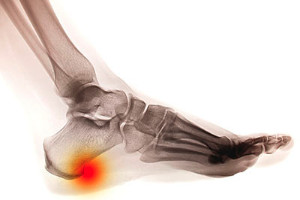 If you are experiencing a sharp pain in the heel of your foot while standing after a night’s sleep, you may have what is referred to as a heel spur. It is generally defined as a hooked or pointy portion of bone that grows outward into the heel. Additional symptoms of this condition would be swelling and tenderness in the heel and surrounding area, a small, hard protrusion under the heel, or a constant dull ache for the majority of the day. A proper diagnosis typically includes having an X-ray performed and this will aid the doctor in viewing the protrusion. There are known to be several causes why heel spurs may develop. These may include participating in running and jumping activities, age progression, or a possible injury to the heel. Research has shown partial relief may be obtained by wearing cushioned shoes that provide adequate support for the heel, reducing pressure on the feet by getting plenty of rest, or possibly taking anti-inflammatory medication. If you feel you have a heel spur, it is suggested to speak with a podiatrist, so the correct treatment can begin.
If you are experiencing a sharp pain in the heel of your foot while standing after a night’s sleep, you may have what is referred to as a heel spur. It is generally defined as a hooked or pointy portion of bone that grows outward into the heel. Additional symptoms of this condition would be swelling and tenderness in the heel and surrounding area, a small, hard protrusion under the heel, or a constant dull ache for the majority of the day. A proper diagnosis typically includes having an X-ray performed and this will aid the doctor in viewing the protrusion. There are known to be several causes why heel spurs may develop. These may include participating in running and jumping activities, age progression, or a possible injury to the heel. Research has shown partial relief may be obtained by wearing cushioned shoes that provide adequate support for the heel, reducing pressure on the feet by getting plenty of rest, or possibly taking anti-inflammatory medication. If you feel you have a heel spur, it is suggested to speak with a podiatrist, so the correct treatment can begin.
Heel spurs can be incredibly painful and sometimes may make you unable to participate in physical activities. To get medical care for your heel spurs, contact one of our podiatrists from Carolina Foot & Ankle. Our doctors will do everything possible to treat your condition.
Heels Spurs
Heel spurs are formed by calcium deposits on the back of the foot where the heel is. This can also be caused by small fragments of bone breaking off one section of the foot, attaching onto the back of the foot. Heel spurs can also be bone growth on the back of the foot and may grow in the direction of the arch of the foot.
Older individuals usually suffer from heel spurs and pain sometimes intensifies with age. One of the main condition's spurs are related to is plantar fasciitis.
Pain
The pain associated with spurs is often because of weight placed on the feet. When someone is walking, their entire weight is concentrated on the feet. Bone spurs then have the tendency to affect other bones and tissues around the foot. As the pain continues, the feet will become tender and sensitive over time.
Treatments
There are many ways to treat heel spurs. If one is suffering from heel spurs in conjunction with pain, there are several methods for healing. Medication, surgery, and herbal care are some options.
If you have any questions feel free to contact one of our offices located in Huntersville Office | 16419 Northcross Dr Suite A, Huntersville, NC 28078; Mooresvillle Office | 206 Joe Knox Avenue Suite D, Mooresville, NC 28117; and Mountain Island | 10310 Couloak Drive Suite 200, Charlotte, NC 28216 . We offer the latest in diagnostic and treatment technology to meet your needs.
